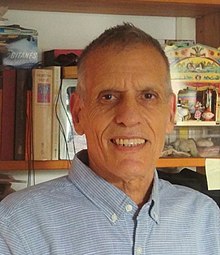Maoz Azaryahu
hideThis article has multiple issues. Please help or discuss these issues on the talk page. (Learn how and when to remove these template messages)
|
Maoz Azaryahu | |
|---|---|
 | |
| Born | 1955 |
| Nationality | Israeli |
| Occupation | Geographer, Academic, Scholar |
| Academic background | |
| Alma mater | Tel Aviv University |
| Academic work | |
| Institutions | Tel Aviv University & University of Haifa |
| Main interests | Cultural History, Mythography |
Maoz Azaryahu (Hebrew: מעוז עזריהו; born 1955) is a professor of cultural geography in the Department of Geography and Environmental Studies at the University of Haifa in Israel[1] and is also the Director of Herzl Institute for the Study of Zionism.[2] His research focuses on the interplay between memory, myth, landscape and place. His abiding interests have been in place-naming as place-making, the cultural politics of commemorative street (re)naming as identity-formation, War memorials, military cemeteries,[3] the commemoration of the fallen in Israel, the cultural history and mythography of Tel Aviv,[4] and space as narrative medium.
Academic Career[]
Azaryahu completed his B.Sc. in the School of Physics & Astronomy at Tel Aviv University in 1975, was awarded an MA in 1983 and obtained his doctorate in 1988. His Ph.D. thesis was on political symbolism in East Germany, focusing on renaming streets in East Berlin. This was one of the first scholarly works to be devoted explicitly to the examination of how commemorative street naming[5] is embedded into the construction of official political identity.
He continued to Postdoctoral studies and taught as guest professor at Lakehead University in Ontario, Canada (1991). He has also been a visiting professor in Jewish Studies at Pennsylvania State University (2000) and in Israel Studies at Brandeis University (2010).[6] Since 1993 he has been teaching in the Department of Geography and Environmental Studies at the University of Haifa, becoming full professor in 2011.
In his role as the Director of Herzl Institute for the Study of Zionism, Azaryahu initiated, assisted, and directed research on the political and cultural history of the State of Israel. In 2020 Azaryahu was awarded the UConn's First Global Distinguished Humanities Fellowship.[7]
Publications[]
- Von Wilhelmplatz zu Thälmannplatz: Politische Symbole im Öffentlichen Leben der DDR 1945-1985, Gerlingen: Bleicher Verlag, 1991 (ISBN 3892445397, ISBN 978-3892445395.)
- State Cults: Celebrating Independence and Commemorating the Fallen in Israel 1948-1956, Beer Sheva: Ben-Gurion University, 1995 (Hebrew)
- Tel Aviv: The Real City, Beer Sheva: Ben-Gurion University, 2005 (Hebrew)
- Tel Aviv: Mythography of a City: Space, Place and Society Series, Syracuse: Syracuse University Press, 2006 (ISBN 0815631294, ISBN 978-0815631293.)
- Tel Aviv's Silver Jubillee: An Anthology, (co-editors: A. Golan[8] and A. Dykman), Jerusalem: Carmel, 2009 (Hebrew)
- Tel Aviv: The First Century. Vision, Myth and Reality, Bloomington & Indianapolis: Indiana University Press (Editor with Ilan Troen), 2012
- The Architecture of the Military Cemeteries: The First Decade, Ramat Gan: Ministry of Defense, 2012 (Hebrew)
- Namesakes: History and Politics of Street Naming in Israel, Jerusalem: Carmel, 2012 (Hebrew)
- A Place for Memory: The Creation of a National Pantheon in Tel Aviv's Old Cemetery, Haifa: Chaikin Chair for Geostrategy,[9] 2015 (Hebrew)
- Narrating Space / Spatializing Narrative: Where narrative theory and geography meet, Columbus: Ohio State University Press, (With Marie-Laure Ryan and Kenneth E. Foote), 2016.
- The Political Life of Urban Streetscapes: Naming, Politics and Place, London and New York: Routledge. (Editor with Reuben Rose-Redwood, Derek H. Alderman), 2017 (ISBN 1472475097, ISBN 9781472475091.)
- Positioning Memory: Collected Studies, Haifa: Herzl Institute for the Study of Zionism, 2018 (Hebrew)
- En Route: From Trieste to Eretz Israel 1920-1940 [Exhibition Catalogue], Haifa: Herzl Institute for the Study of Zionism, 2019 (Hebrew)
- Naming, Identity and Tourism, Newcastle: Cambridge Scholars Publishing (co-editors: Luisa Caiazzo and Richard Coates), 2020 (ISBN 1527542866, ISBN 978-1527542860.)
- An Everlasting Name: Cultural Remembrance and Traditions of Onymic Commemoration, Berlin/Boston: De Gruyter Oldenbourg, 2021 (ISBN 3110722992, ISBN 978-3110722994.)
- The State of Tel Aviv: A Brief History, Ra'anana: Lamda Iyun / Open University Press and Ben-Gurion University Press, 2021 (Hebrew)[10]
References[]
- ^ https://geo.hevra.haifa.ac.il/index.php/en/people/academic-staff The Department of Geography and Environmental Studies - academic-staff
- ^ https://herzl.haifa.ac.il/index.php/en/about/staff staff Herzl Ins.
- ^ Baumel-Schwartz, Judy (2005). "Book Review, Judy Baumel-Schwartz - A man behind a tombstone (Heb.), by Maoz Azaryahu" (PDF). Cathedra. 154. Retrieved 22 July 2021.
- ^ https://www.youtube.com/watch?v=J21Bd4IJtt4 Lecture on Youtube - mythic Tel Aviv
- ^ https://www.acme-journal.org/index.php/acme/article/view/883/739 The Critical Turn and Beyond: The Case of Commemorative Street Naming
- ^ https://www.brandeis.edu/israel-center/about/visitors/visiting-faculty.html List of visiting Faculty at The Schusterman Center, Brandeis University
- ^ https://humanities.uconn.edu/2020/06/18/uconns-first-global-distinguished-humanities-fellowship-awarded/ Official Announcement - GDHF.
- ^ "ארנון גולן". 1 January 2021 – via Wikipedia.
- ^ "קתדרת חייקין לגאואסטרטגיה". 15 January 2021 – via Wikipedia.
- ^ https://www.haaretz.co.il/literature/study/.premium-REVIEW-1.9973962 Hanoch Marmari, literatur rereview - Haaretz, 6.7.2021.
External links[]
- Maoz Azaryahu publications indexed by Google Scholar
- The Herzl Institute for the Study of Zionism Website
- Maoz Azaryahu on JSTOR
This article needs additional or more specific categories. (July 2021) |
- 1955 births
- Living people
- Israeli geographers
- University of Haifa faculty
